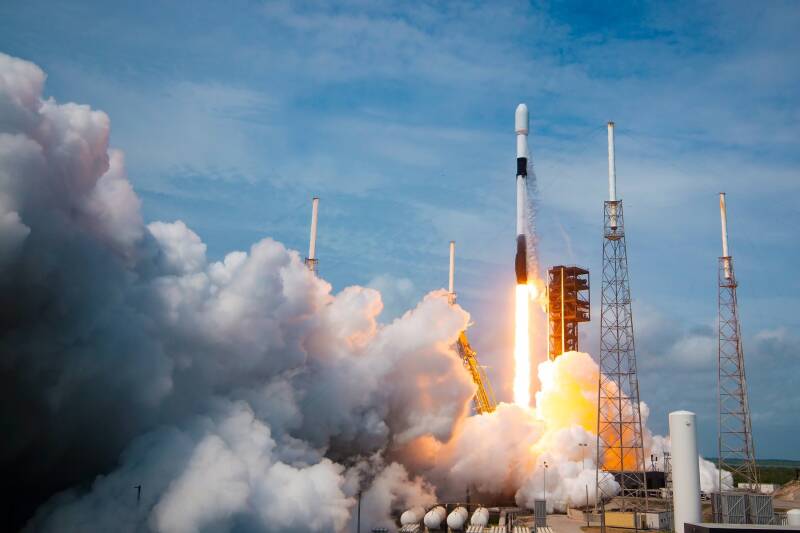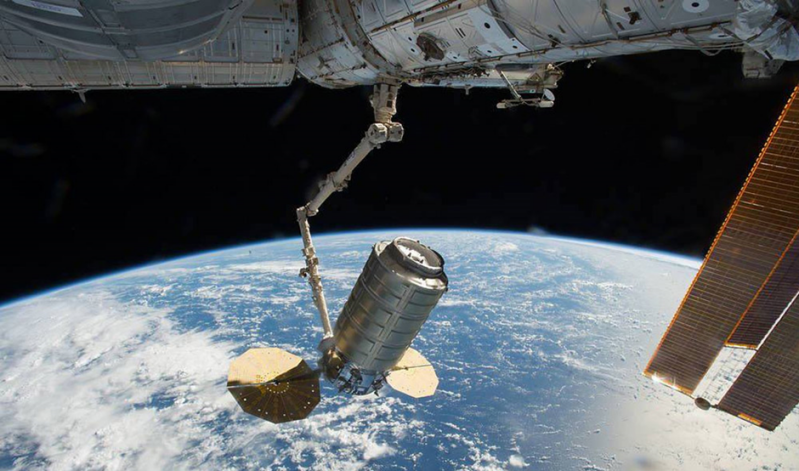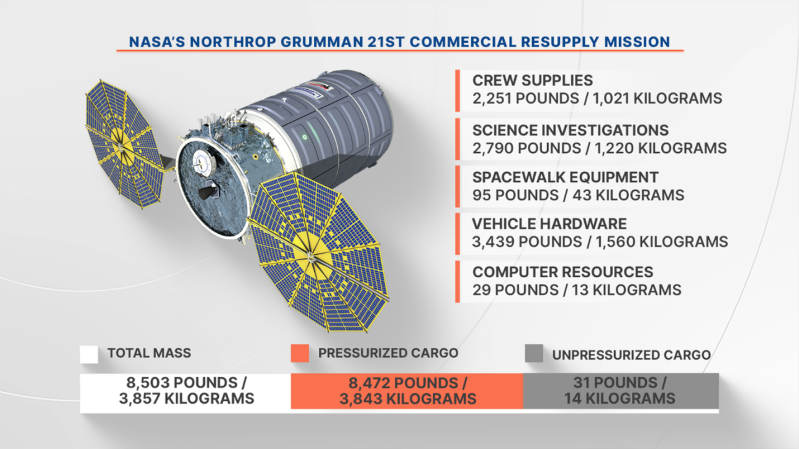In another precise and efficient launch operation, SpaceX's Falcon 9 rocket successfully lifted off from Cape Canaveral Space Force Station in Florida on August 4, 2024, at 11:02 a.m. EDT. The mission, designated Cygnus NG-21, carried a cargo spacecraft packed with nearly 8,200 pounds of essential supplies, scientific equipment, and experimental payloads bound for the International Space Station (ISS). About eight minutes after launch, the rocket's first stage came back for a landing at Cape Canaveral as planned. Then, just under 15 minutes after liftoff, the Cygnus deployed from the Falcon 9's upper stage into low Earth orbit.

Falcon 9 lifts off fromCape Canaveral Space Force Sation, Florida carrying NG-21 Cargo Spacecraft. Image Credit: SpaceX
The Cygnus spacecraft, named S.S. Richard "Dick" Scobee in honor of the late NASA astronaut, is expected to dock with the ISS and remain attached for an extended period, until January 2025. This marks the 21st successful Cygnus cargo flight to the ISS, with the previous launch, NG-20, taking place in July 2024.
Resupply Mission
The Cygnus spacecraft is packed with over 8,200 pounds of supplies, including:
- Scientific experiments and equipment to support dozens of research investigations during Expeditions 71 and 72
- Hardware to upgrade and maintain the ISS's systems and infrastructure
- Critical materials to support the daily lives of the astronauts on board
The spacecraft will arrive at the ISS on Monday, August 5, and will be captured by NASA astronaut Matthew Dominick using the station's robotic arm. After capture, the spacecraft will be installed on the Unity module's Earth-facing port and will spend almost six months connected to the orbiting laboratory before departing in January 2025.
Scientific Investigations
The resupply mission includes several ground-breaking scientific investigations, such as:
Gravitational Effects on Filtration Systems: A study on how gravity affects two-phase flow in porous media, which could lead to improvements in water purification and heating and cooling systems.
MVP Cell-07 Experiment:: An experiment to produce human hematopoietic stem cells in space, which could lead to breakthroughs in treating blood diseases and cancers.

Cygnus Spacecraft Image Credit: Northrop Grumman/ NASA
Rotifer-B2 Experiment: A study on how spaceflight affects DNA repair mechanisms in microscopic organisms, which could improve our understanding of DNA damage and repair.
Bioprinting Tissue Maturation: An investigation into the development of blood vessels in engineered liver tissue constructs in microgravity.
Cubesats: Two tiny cubesats are hitching a ride to the ISS on NG-21 as part of NASA's ELaNa (Educational Launch of Nanosatellites) program. The pair will deploy from the ISS after the Cygnus docks.

NASA’s Northrop Grumman 21st commercial resupply mission will carry more than 8,500 pounds (3,856 kilograms) of cargo to the International Space Station. NASA
Cargo Highlights
The resupply mission includes critical hardware, such as:
- International Space Station Roll Out Solar Array Modification Kit 8: An upgrade kit to support the installation of new solar arrays, which will augment the station's original solar arrays and provide a net increase in power.
- Plant Habitat Environmental Control System: A component of the Advanced Plant Habitat to control temperature, humidity, and air flow, supporting plant bioscience research in orbit.
- Rate Gyro Enclosure Assembly: A spare unit to determine the rate of angular motion of the ISS, ensuring the station's stability and navigation.
- European Enhanced Exercise Device & Vibration Isolation and Stabilization System (E4D VIS) Assembly Kit : A kit to support the assembly of the E4D exercise device, designed to prevent muscle and bone deterioration during long space missions.
These experiments and cargo will contribute to the ongoing research and operations on the ISS, with the Cygnus NG-21 spacecraft expected to remain docked until January 2025.
The NG-21 mission highlights the critical role of private space companies like SpaceX and Northrop Grumman (manufacturer of the Cygnus spacecraft) in supporting the ISS program and enabling continued scientific research and exploration in low-Earth orbit. As the ISS remains a vital platform for advancing our understanding of space and developing new technologies, reliable and efficient cargo resupply missions like Cygnus NG-21 are essential to its operation.


Add comment
Comments